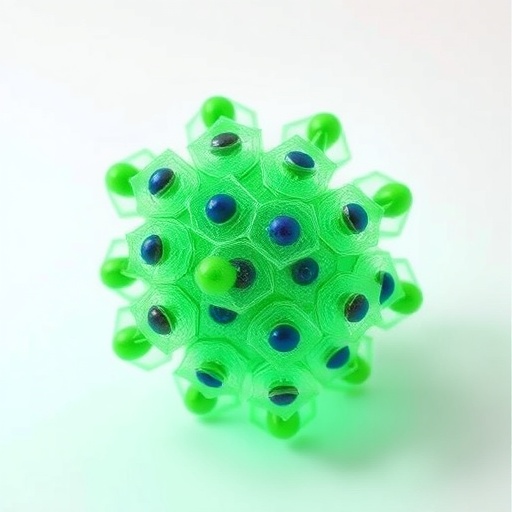In the relentless pursuit of advanced energy storage solutions, researchers have turned their attention to metal-organic frameworks (MOFs), particularly zinc-based variants. The recent study by Deepikaa et al. explores a groundbreaking development in this field, focusing on the design and electrochemical profiling of a zinc metal-organic framework (Zn-MOF) specifically engineered for next-generation supercapacitors. This research paves the way for innovative energy storage technologies that may significantly enhance the performance of supercapacitors, which are becoming vital as the demand for efficient energy sources continues to rise.
Zinc has emerged as an ideal choice for creating MOFs due to its accessibility, cost-effectiveness, and favorable electrochemical properties. The authors of the study meticulously developed Zn-MOFs that promise to maximize energy density and power performances. Their innovative approach addresses many of the limitations faced by conventional supercapacitor materials, such as low energy density and poor stability. By employing well-established synthesis methods and optimization techniques, the researchers successfully created a Zn-MOF with a unique porous structure that optimizes ion transport and charge storage capabilities.
The synthesized Zn-MOF is not only characterized by its impressive surface area but also by its high porosity, vital features that contribute to its supercapacitor performance. The researchers conducted a series of electrochemical tests, demonstrating that this material offers enhanced charge/discharge rates and superior cycle stability when compared to traditional materials used in energy storage devices. This leap in performance can be attributed to the intricate design of the MOFs that maximizes surface contact between the electroactive material and the electrolyte, factors crucial for efficient charge storage.
What makes this study particularly revolutionary is its comprehensive electrochemical profiling of the Zn-MOF. The researchers employed various techniques such as cyclic voltammetry and galvanostatic charge-discharge tests to gauge the effectiveness of their material. Results from these tests indicate that the Zn-MOF not only supports rapid charge transfer but also maintains a stable electrochemical performance over extended periods. This level of performance is not just promising; it signifies a transformative change in the potential applications for supercapacitors in modern electronics.
The potential applications for these advanced Zn-MOF supercapacitors are both broad and groundbreaking. With electric vehicles (EVs) gaining traction and portable electronics becoming more ubiquitous, the demand for efficient and reliable energy storage solutions continues to grow. Supercapacitors based on Zn-MOFs, as demonstrated in this study, could provide the improved energy density necessary to compete with traditional lithium-ion batteries while maintaining the rapid charge-discharge capabilities that supercapacitors are known for.
Moreover, this research sheds light on the environmental advantages of utilizing Zn-MOFs in energy storage. Zinc is abundant in nature and is recyclable, making it a more sustainable choice compared to other materials commonly used in supercapacitor technologies. The researchers have effectively underscored how the integration of such sustainable materials can contribute to a greener future in energy storage solutions, reconciling technological advancement with environmental stewardship.
As the transition to renewable energy sources accelerates, efficient energy storage technologies will play a pivotal role in balancing supply and demand. The impressive characteristics of Zn-MOFs outlined in this research highlight their potential contribution to the sustainability of energy systems. By replacing conventional energy sources with more sustainable alternatives, the academic community signifies a collective commitment to addressing climate change and environmental degradation.
The findings from Deepikaa and colleagues not only advance the scientific understanding of metal-organic frameworks in energy applications but also set a new benchmark for future research in the field. The integration of novel synthesis techniques with advanced characterization methods signifies a well-rounded approach to material science. This holistic viewpoint could inspire subsequent studies aimed at optimizing other metal-organic frameworks for various applications, thereby broadening the scope and impact of research in this area.
Future investigations may also focus on scaling the production of these Zn-MOFs, addressing any potential operational challenges that may arise. The transition from laboratory-scale synthesis to industrial production presents unique challenges, but the implications for energy storage technology could be profound. This study offers a blueprint that can potentially transform laboratory success into commercial viability, facilitating the widespread adoption of these advanced supercapacitors.
The research conducted by Deepikaa et al. marks a significant step forward in the ongoing quest for efficient energy storage solutions. By showcasing the potential of Zn-MOFs, the authors have emphasized not just the capabilities of this innovative material but also the pressing need for alternative energy storage technologies in a world that is steadily moving towards electrification.
In summary, the exploration and development of Zn-MOFs as next-generation supercapacitors is a testament to the ingenuity and persistence of modern science. The compelling results from this research point toward new horizons in energy storage technology, reinforcing the idea that while challenges remain, there are also remarkable opportunities for innovation and transformation in this rapidly evolving field. The future of supercapacitors is undoubtedly bright, and the potential contributions of Zn-MOFs could well be at the forefront of this exciting evolution.
In conclusion, the study by Deepikaa and colleagues not only provides a glimpse into the future of energy storage but also serves as a crucial reminder of the importance of sustainable materials in technological advancements. As research continues to unfold, it is evident that the intersection of material science and energy storage technologies will continue to thrive, driving humanity towards a more sustainable and energy-efficient future.
Subject of Research: Design and electrochemical profiling of Zn-MOF for next-generation supercapacitors.
Article Title: Design and electrochemical profiling of Zn-MOF for next-generation supercapacitors.
Article References:
Deepikaa, M., Karthickprabhu, S., Karuppasamy, K. et al. Design and electrochemical profiling of Zn-MOF for next-generation supercapacitors. Ionics (2025). https://doi.org/10.1007/s11581-025-06692-5
Image Credits: AI Generated
DOI: https://doi.org/10.1007/s11581-025-06692-5
Keywords: zinc metal-organic frameworks, supercapacitors, energy storage, sustainability, electrochemical profiling.
Tags: advanced energy storage technologiescost-effective zinc-based MOFselectrochemical profiling of MOFshigh porosity energy materialsinnovative energy storage solutionsmaximizing energy density in supercapacitorsnext-generation supercapacitorsoptimizing ion transport in supercapacitorsovercoming limitations of conventional materialssynthesis methods for Zn-MOFszinc metal-organic frameworksZn-MOF supercapacitor design





